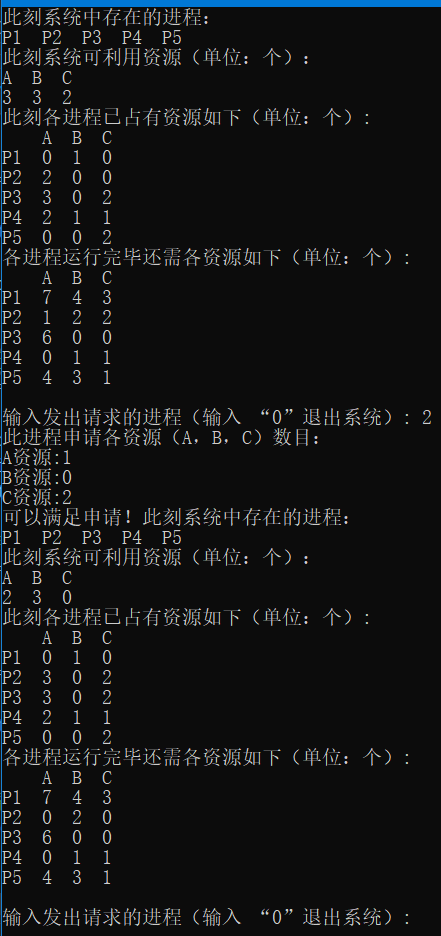/*子函数声明*/
int Isprocessallover(); //判断系统中的进程是否全部运行完毕
void Systemstatus(); //显示当前系统中的资源及进程情况
int Banker(int, int*); //银行家算法
void Allow(int, int*); //若进程申请不导致死锁,用此函数分配资源
void Forbidenseason(int); //若发生死锁,则显示原因
/*全局变量*/
int Availiable[3] = { 3,3,2 }; //初始状态,系统可用资源量
int Max[5][3] = { {7,5,3},{3,2,2},{9,0,2},{2,2,2},{4,3,3} }; //各进程对各资源的最大需求量
int Allocation[5][3] = { {0,1,0},{2,0,0},{3,0,2},{2,1,1},{0,0,2} }; //初始状态,各进程占有资源量
int Need[5][3] = { {7,4,3},{1,2,2},{6,0,0},{0,1,1},{4,3,1} };
//初始状态时,各进程运行完毕,还需要的资源量
int over[5] = { 0,0,0,0,0 }; //标记对应进程是否得到所有资源并运行完毕
#include <iostream>
using namespace std;
/*主函数*/
void main()
{
int process = 0; //发出请求的进程
int decide = 0; //银行家算法的返回值
int Request[3] = { 0,0,0 }; //申请的资源量数组
int sourcenum = 0; //申请的各资源量
/*判断系统中进程是否全部运行完毕*/
step1:
if (Isprocessallover() == 1)
{
cout << "系统中全部进程运行完毕!"; //判断系统中的进程是否运行完毕
return;
}
/*显示系统当前状态*/
Systemstatus();
/*人机交互界面*/
step2:
cout << "\n输入发出请求的进程(输入 “0”退出系统): ";
cin >> process;
if (process == 0) //若发出请求的进程数量为0则退出系统
{
cout << "放弃申请,退出系统!";
return;
}
if (process < 1 || process>5 || over[process - 1] == 1)
{ //若发出请求的进程数量超过或小于系统进程的最大值或最小值,则输出“系统无此进程”
cout << "系统无此进程!\n";
goto step2;
}
cout << "此进程申请各资源(A,B,C)数目:\n";
for (int h = 0; h < 3; h++)
{
cout << char(65 + h) << "资源:"; //利用ASCII码把1、2、3转换成A、B、C
cin >> sourcenum; //输入要申请的资源数量
Request[h] = sourcenum;//把要申请的资源数量放Request数组里面
}
/*用银行家算法判断是否能够进行分配*/
decide = Banker(process, Request);
if (decide == 0)
{
/*将此进程申请资源分配给它*/
Allow(process, Request);
goto step1;
}
else
{
/*不能分配,显示原因*/
Forbidenseason(decide);
goto step2;
}
}
/*子函数Isprocessallover( )的实现*/
int Isprocessallover()
{
int processnum = 0;
for (int i = 0; i < 5; i++)
{
/*判断每个进程是否运行完毕*/
if (over[i] == 1)
processnum++;
}
if (processnum == 5)
/*系统中全部进程运行完毕*/
return 1;
else
return 0;
}
/*子函数Systemstatus( )的实现*/
void Systemstatus()
{
cout << "此刻系统中存在的进程:\n";
for (int i = 0; i < 5; i++)
{
if (over[i] != 1)
cout << "P" << i + 1 << " ";
}
cout << endl;
cout << "此刻系统可利用资源(单位:个):\n";
cout << "A B C\n";
for (int a = 0; a < 3; a++)
{
cout << Availiable[a] << " ";
}
cout << endl;
cout << "此刻各进程已占有资源如下(单位:个): \n"
<< " A B C\n";
for (int b = 0; b < 5; b++)
{
if (over[b] == 1)
continue;
cout << "P" << b + 1 << " ";
for (int c = 0; c < 3; c++)
cout << Allocation[b][c] << " ";
cout << endl;
}
cout << "各进程运行完毕还需各资源如下(单位:个):\n"
<< " A B C\n";
for (int f = 0; f < 5; f++)
{
if (over[f] == 1)
continue;
cout << "P" << f + 1 << " ";
for (int g = 0; g < 3; g++)
cout << Need[f][g] << " ";
cout << endl;
}
}
/*子函数Banker(int ,int &)的实现*/
int Banker(int p, int* R)
{
int num = 0; //标记各资源是否能满足各进程需要
int Finish[5] = { 0,0,0,0,0 }; //标记各进程是否安全运行完毕
int work[5] = { 0,0,0,0,0 }; //用于安全检查
int AvailiableTest[3]; //用于检查系统可用资源类是否满足分配需求
int AllocationTest[5][3]; //用于检查各个进程占有的资源类能否满足分配需求
int NeedTest[5][3]; //用于检查各进程运行完毕还需要的进程量能否满足需求
/*判断申请的资源是否大于系统可提供的资源总量*/
for (int j = 0; j < 3; j++)
{
if (*(R + j) > Availiable[j])
/*返回拒绝分配原因*/
return 1;
}
/*判断该进程申请资源量是否大于初始时其申明的需求量*/
for (int i = 0; i < 3; i++)
{
if (*(R + i) > Need[p - 1][i])
/*返回拒绝原因*/
return 2;
}
/*为检查分配的各数据结构赋初值*/
for (int t = 0; t < 3; t++)
{
AvailiableTest[t] = Availiable[t];
}
for (int u = 0; u < 5; u++)
{
for (int v = 0; v < 3; v++)
{
AllocationTest[u][v] = Allocation[u][v];
}
}
for (int w = 0; w < 5; w++)
{
for (int x = 0; x < 3; x++)
{
NeedTest[w][x] = Need[w][x];
}
}
/*进行试分配*/
for (int k = 0; k < 3; k++) //修改NeedTest[]
{
AvailiableTest[k] -= *(R + k);
AllocationTest[p - 1][k] += *(R + k);
NeedTest[p - 1][k] -= *(R + k);
}
/*检测进程申请得到满足后,系统是否处于安全状态*/
for (int l = 0; l < 3; l++)
{
work[l] = AvailiableTest[l];
}
for (int m = 1; m <= 5; m++)
{
for (int n = 0; n < 5; n++)
{
num = 0;
/*寻找用此刻系统中没有运行完的进程*/
if (Finish[n] == 0 && over[n] != 1)
{
for (int p = 0; p < 3; p++)
{
if (NeedTest[n][p] <= work[p])
num++;
}
if (num == 3)
{
for (int q = 0; q < 3; q++)
{
work[q] = work[q] + AllocationTest[n][q];
}
Finish[n] = 1;
}
}
}
}
for (int r = 0; r < 5; r++)
{
if (Finish[r] == 0 && over[r] != 1)
/*返回拒绝分配原因*/
return 3;
}
return 0;
}
/*子函数Allow(int ,int &)的实现*/
void Allow(int p, int* R)
{
cout << "可以满足申请!";
static int overnum;
/*对进程所需的资源进行分配*/
for (int t = 0; t < 3; t++)
{
Availiable[t] = Availiable[t] - *(R + t);
Allocation[p - 1][t] = Allocation[p - 1][t] + *(R + t);
Need[p - 1][t] = Need[p - 1][t] - *(R + t);
}
/*分配后判断其是否运行完毕*/
overnum = 0;
for (int v = 0; v < 3; v++)
{
if (Need[p - 1][v] == 0)
overnum++;
}
if (overnum == 3)
{
/*此进程运行完毕,释放其占有的全部资源*/
for (int q = 0; q < 3; q++)
Availiable[q] = Availiable[q] + Allocation[p - 1][q];
/*标记该进程运行完毕*/
over[p - 1] = 1;
cout << "进程P" << p << "所需资源全部满足,此进程运行完毕!\n";
}
}
/*子函数Forbidenseason(int )的实现*/
void Forbidenseason(int d)
{
cout << "不能满足申请,此进程挂起,原因为:\n";
switch (d)
{
case 1:cout << "申请的资源量大于系统可提供的资源量!"; break;
case 2:cout << "申请的资源中有某种资源大于其声明的需求量!"; break;
case 3:cout << "若满足申请,系统将进入不安全状态,可能导致死锁!";
}
}




 浙公网安备 33010602011771号
浙公网安备 33010602011771号